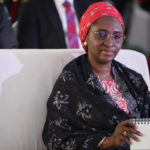The Federal Government of Nigeria has now projected oil earnings to decline by 90.0 percent in 2020 even as it expects the gross domestic product (GDP) of the country to contract by 3.5 percent year on year (YoY) in 2020, according to Mrs. (Dr.) Zainab Ahmed, the Honourable Minister of Finance, Budget and National Planning.
At the citizens dialogue session by the Ministry of Finance, Budget and National Planning and the Department for Internal Development (DFID) yesterday on Government Fiscal Policy Decisions in Response to the Fall in Oil Prices and the COVID-19 Pandemic, the government representatives led by Ahmed presented a number of key decisions taken.
According to the government, estimated net oil and gas revenue available for Federation Account Allocation Committee (FAAC) distribution “is now forecasted 80.0 percent lower at N1.1 trillion against N5.5 trillion forecasted previously, despite a N649 billion reduction in allowable fiscal deductions by Nigerian National Petroleum Corporation (NNPC) for federally-funded projects/expenditures. Specifically, projected premium motor spirit (PMS) under-recovery has been reduced from N457 billion to zero.
The oil production is now projected at 1.7mbpd as against the previous 2.18mbpd, with oil prices expected to average $20 per barrel (vs. budget benchmark of $57 per barrel). The average production cost of Nigerian crude has been revised downward to $28 per barrel from $33 per barrel (with implications for Petroleum Profit Tax).
A severe outbreak of COVID-19 in Nigeria could magnify the impact of low oil price and weaker domestic crude production, says the government.
Meanwhile, Customs revenue is now projected at N1.2 trillion in 2020 (vs. N1.5 trillion previously), and the amount accruable to value-added tax (VAT) pool account now forecasted at N2.0 trillion in 2020 instead of the previous N2.1 trillion.
The amount accruable to federation account now projected at N3.9 trillion against N8.6 trillion previously, and the projected federal government receipt from federation account for 2020 is now put at N2.4 trillion (compared to N4.8 trillion previously).
States and Local Governments are now likely to obtain N2.1 trillion and N1.5 trillion, apiece, from FAAC, compared to N3.3 trillion and N2.5 trillion, respectively, in previous estimates. The projected N5.6 trillion budget deficit to be financed through privatization proceeds (N126 billion), drawdowns from FGN Special Accounts (c.N260 billion), bilateral/multilateral drawdowns (N387 billion), and new borrowings (N4.6 trillion).
The debt service pressure is to be eased by significant moratoriums on new loans (IMF’s RFI of $3.4 billion comes with three years moratorium) and expected deferrals of current debt service obligations, until macro conditions improve.
As part of measures to alleviate the impact of COVID-19, it was stated: “The government has set up an Economic Sustainability Committee to, among others, assess systemic vulnerabilities and develop programs that would make the expected recession short-lived and ensure sustainable long-term growth.”
On agricultural value-chain, measures, according to the government, are underway to strengthen agricultural value-chain with strategic focus on land acquisition, road networks, and funding. Government also plans to offtake agro-products when market conditions are unfavourable.
While government is looking at funding supports for the aviation sector, President Buhari is likely to decide on land border closures after the current health crisis. Negotiations with neighboring countries have been smooth.
“Although similar challenges were faced in 2016, Nigeria currently has significantly lower fiscal buffers. In view of the challenges, government has approved the integrated policy framework recommended by the CMC and adjustments to the 2020 budget,” it was also stated.
On medium term expenditure framework and strategy paper (MTEF/FSP), it was stated that the budget office is finalising a revised 2020-2022 medium term expenditure framework and strategy paper as well as an amendment to the 2020 Appropriation act.
According to Nigerian Economic Summit Group (NESG), the country needs N10.1 trillion worth of interventions, but current intervention capacity stands at N4.5 trillion.
The implied funding gap of N5.6 trillion is likely to be covered by medium to long term domestic borrowing, with external borrowings (possibly from World Bank, IMF, IFC, AFDB). NESG also stated that the total announced stimulation (FG, CBN, e’tal) currently stands at N4.5 trillion or 3.1 percent of GDP (vs. 10.0 percent of GDP in South Africa).
Also present at the session were Prince Clem Agba (Minister of State, Budget and National Planning), Mr. Ben Akabueze, Director-general (DG), Budget Office of the Federation), and Lade Jaiyeola (CEO, Nigeria Economic Summit Group).






